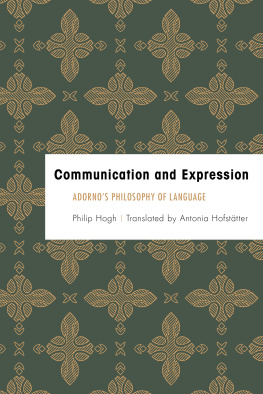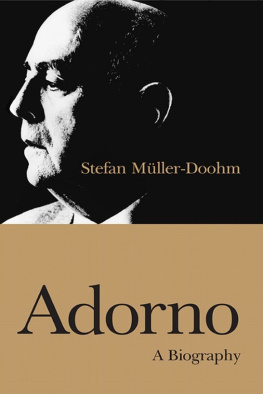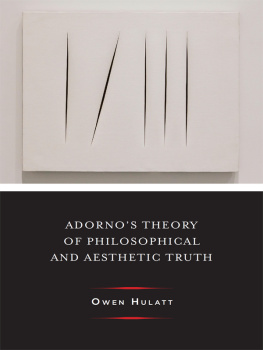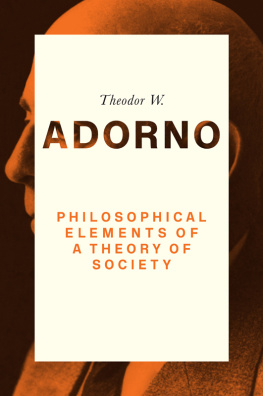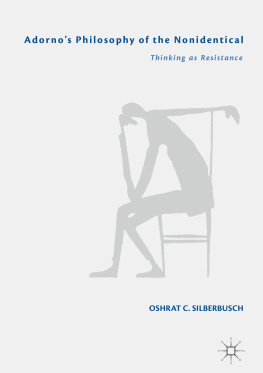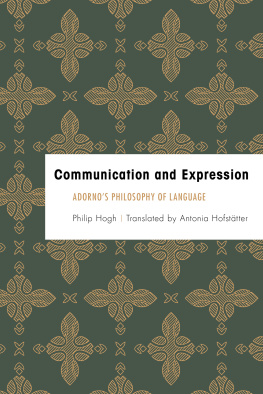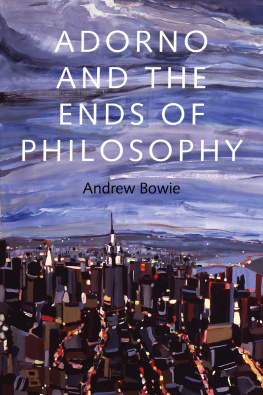Hofstatter Hogh - Communication and Expression: Adornos Philosophy of Language
Here you can read online Hofstatter Hogh - Communication and Expression: Adornos Philosophy of Language full text of the book (entire story) in english for free. Download pdf and epub, get meaning, cover and reviews about this ebook. year: 2017, publisher: Rowman & Littlefield International, genre: Religion. Description of the work, (preface) as well as reviews are available. Best literature library LitArk.com created for fans of good reading and offers a wide selection of genres:
Romance novel
Science fiction
Adventure
Detective
Science
History
Home and family
Prose
Art
Politics
Computer
Non-fiction
Religion
Business
Children
Humor
Choose a favorite category and find really read worthwhile books. Enjoy immersion in the world of imagination, feel the emotions of the characters or learn something new for yourself, make an fascinating discovery.
- Book:Communication and Expression: Adornos Philosophy of Language
- Author:
- Publisher:Rowman & Littlefield International
- Genre:
- Year:2017
- Rating:3 / 5
- Favourites:Add to favourites
- Your mark:
- 60
- 1
- 2
- 3
- 4
- 5
Communication and Expression: Adornos Philosophy of Language: summary, description and annotation
We offer to read an annotation, description, summary or preface (depends on what the author of the book "Communication and Expression: Adornos Philosophy of Language" wrote himself). If you haven't found the necessary information about the book — write in the comments, we will try to find it.
Communication and Expression: Adornos Philosophy of Language — read online for free the complete book (whole text) full work
Below is the text of the book, divided by pages. System saving the place of the last page read, allows you to conveniently read the book "Communication and Expression: Adornos Philosophy of Language" online for free, without having to search again every time where you left off. Put a bookmark, and you can go to the page where you finished reading at any time.
Font size:
Interval:
Bookmark:
Communication and Expression
Founding Critical Theory
Series Editors
Owen Hulatt , Teaching Fellow, Department of Philosophy, University of York
Darrow Schecter , Reader in Critical Theory, University of Sussex
Editorial Review Board
Brian OConnor, University College Dublin, Ireland
Gordon Finlayson, University of Sussex, UK
Werner Bonefeld, University of York, UK
Fred Rush, Notre Dame University, USA
Jay Bernstein, The New School, USA
Lambert Zuidervaart, Institute for Christian Studies, Canada
Deborah Cook, University of Windsor, Canada
Christoph Menke, Goethe Universitat, Germany
Andrew Arato, The New School, USA
This series publishes original research on prominent figures, texts and topics in, and associated with, the first generation of Frankfurt School Critical Theory. The series comprises specialised treatments of topics and thinkers together with new translations of key texts from the period. Emphasis is lent to Critical Theory as an ongoing research project, and both its original research and historical scholarship is articulated in these terms. Critical Theory contains an intrinsic commitment to interdisciplinary research, and this series attempts to honour this commitment where possible.
The Aesthetic Ground of Critical Theory , edited by Nathan Ross
Communication and Expression , Philip Hogh, translated by Antonia Hofsttter
Communication and Expression
Adornos Philosophy of Language
Philip Hogh
Translated by Antonia Hofsttter

London New York
Published by Rowman & Littlefield International Ltd
Unit A, Whitacre Mews, 26-34 Stannary Street, London SE11 4AB
www.rowmaninternational.com
Rowman & Littlefield International, Ltd. is an affiliate of Rowman & Littlefield
4501 Forbes Boulevard, Suite 200, Lanham, Maryland 20706, USA
With additional offices in Boulder, New York, Toronto (Canada), and Plymouth (UK)
www.rowman.com
Copyright 2017 Philip Hogh and Antonia Hofsttter
All rights reserved. No part of this book may be reproduced in any form or by any electronic or mechanical means, including information storage and retrieval systems, without written permission from the publisher, except by a reviewer who may quote passages in a review .
The translation of this work was funded by Geisteswissenschaften International Translation Funding for Work in the Humanities and Social Sciences from Germany, a joint initiative of the Fritz Thyssen Foundation, the German Federal Foreign Office, the collecting society VG WORT, and the Brsenverein des Deutschen Buchhandels (German Publishers and Booksellers Association).
British Library Cataloguing in Publication Data
A catalogue record for this book is available from the British Library
ISBN: HB 978-1-7834-8727-1
PB 978-1-7834-8728-8
Library of Congress Cataloging-in-Publication Data
Names: Hogh, Philip, author.
Title: Communication and expression : Adornos philosophy of language / Philip Hogh; translated by Antonia Hofsttter.
Other titles: Kommunikation und Ausdruck. English
Description: Lanham : Rowman & Littlefield International, 2016. | Series: Founding critical theory | Includes bibliographical references and index.
Identifiers: LCCN 2016051702 (print) | LCCN 2016052979 (ebook) | ISBN 9781783487271 (cloth : alk. paper) | ISBN 9781783487288 (pbk. : alk. paper) | ISBN 9781783487295 (Electronic)
Subjects: LCSH: Language and languagesPhilosophy. | Adorno, Theodor W., 19031969.
Classification: LCC P107.H6413 2016 (print) | LCC P107 (ebook) | DDC 401dc23
LC record available at https://lccn.loc.gov/2016051702
 The paper used in this publication meets the minimum requirements of American National Standard for Information SciencesPermanence of Paper for Printed Library Materials, ANSI/NISO Z39.48-1992.
The paper used in this publication meets the minimum requirements of American National Standard for Information SciencesPermanence of Paper for Printed Library Materials, ANSI/NISO Z39.48-1992.
Printed in the United States of America
Contents
Thanks to an invitation from Jay Bernstein, I spent the period from July 2010 to February 2011 in New York, where I was able to work in a focused and undisturbed way. For this, I am very grateful. During this period, I had several meetings with Roger Foster, who subjected to trenchant but sympathetic criticism the reflections that would eventually form my chapter on communicative theory. His critique was very helpful. In our conversations in New York about Adorno, Lydia Goehr time and again advised me to take more seriously, than I was initially inclined, Adornos justified refusal to erect a normative philosophical systemprecisely in the context of his communicative theory.
Since I took up work at the Adorno Research Centre at the Philosophy Department at the University of Oldenburg in the autumn of 2011, I have benefited from numerous discussions with my colleagues. It is also thanks to these colleaguesMaxi Berger, Ingo Elbe, Sven Ellmers, Richard Klein, Johann Kreuzer, Martin Mettin, Stefan Mller-Doohm, Ulrich Ruschig, and Christine Zunkethat Oldenburg has become an independent and outstanding site for critical theory in Germany, apart from Frankfurt am Main.
I would like to thank Jochen Gimmel, Jan Mller, and Sebastian Trnkle for the countless and intensive discussions in Freiburg, Frankfurt, and Berlin, which were productive not least because all three, next to their impressive philosophical knowledge, possess an unrivalled sense of humour.
If I had not had the pleasure of meeting Fabian Freyenhagen, after reading his work on Adornos practical philosophy, the publication of this book might never have happened. I would like to thank him very much for introducing me to Owen Hulatt and Darrow Schecter, editors of the series Founding Critical Theory. In turn, I would like to thank the editors for making possible the publication of this book and for taking care of the process right from the start. I still find it hard to believe that my work has been translated into English. I would like to thank Antonia Hofsttter for the prompt and formidable translation.
I am grateful to Marietta Thien of Velbrck Wissenschaft, who, together with Sarah Campbell and Sinead Murphy of Rowman and Littlefield, made sure that the German version of this book (published at Velbrck Wissenschaft in 2015) entered the funding competition at Geisteswissenschaften International. I would like to thank this funding body for financing the translation and publication of this book. Furthermore, I am grateful to Sarah Campbell and Sinead Murphy for their friendly support.
This book is dedicated to Julia Knig. Our discussions surrounding our joint work on the concept of second nature not only improved large parts of this book, but she also taught me that only a small part of ones thought belongs to oneself, and showed me how much it is rooted in a sphere from which philosophy sometimes fatally and to its own detriment abstracts: from a life that is led together. This is why my greatest gratitude is owed to her.
NOTE
.Stefan Deines and Philip Hogh (eds.), Sprache und Kritische Theorie (Frankfurt/Main and New York: Campus, 2016).
Language, however, is still one of the most important fields of philosophy. Whilst not all the problems of philosophy can be solved entirely through reflections on language, one cannot solve philosophical problems fully without reflecting on language. Adornos utterance is thus not to be understood as a completely dated expression, one of times long past, but rather as an indicator of a philosophical sensitivity to language that has not yet received the attention it deserves.
Next pageFont size:
Interval:
Bookmark:
Similar books «Communication and Expression: Adornos Philosophy of Language»
Look at similar books to Communication and Expression: Adornos Philosophy of Language. We have selected literature similar in name and meaning in the hope of providing readers with more options to find new, interesting, not yet read works.
Discussion, reviews of the book Communication and Expression: Adornos Philosophy of Language and just readers' own opinions. Leave your comments, write what you think about the work, its meaning or the main characters. Specify what exactly you liked and what you didn't like, and why you think so.

